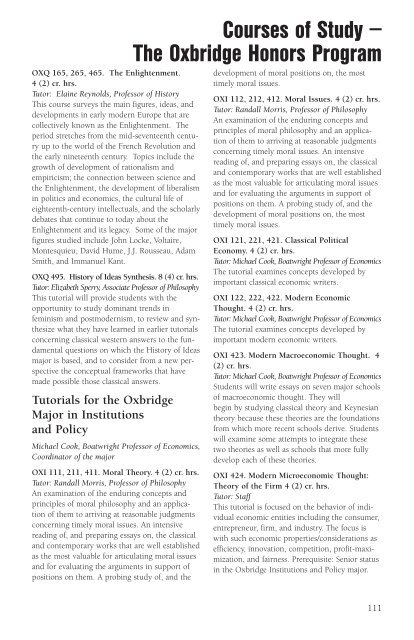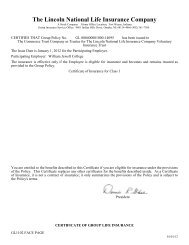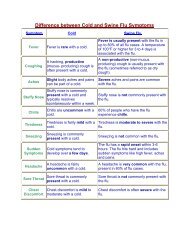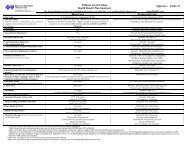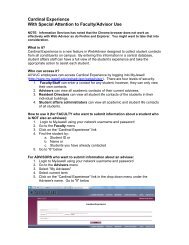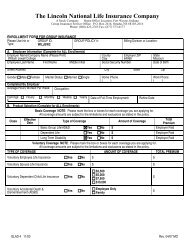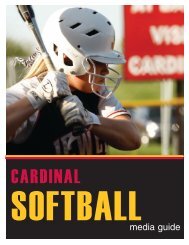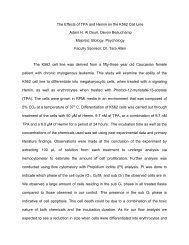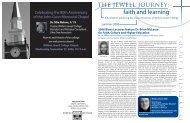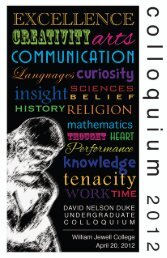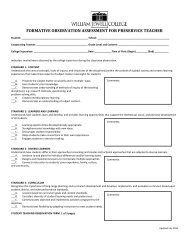Courses of Study - William Jewell College
Courses of Study - William Jewell College
Courses of Study - William Jewell College
You also want an ePaper? Increase the reach of your titles
YUMPU automatically turns print PDFs into web optimized ePapers that Google loves.
OXQ 165, 265, 465. The Enlightenment.<br />
4 (2) cr. hrs.<br />
Tutor: Elaine Reynolds, Pr<strong>of</strong>essor <strong>of</strong> History<br />
This course surveys the main figures, ideas, and<br />
developments in early modern Europe that are<br />
collectively known as the Enlightenment. The<br />
period stretches from the mid-seventeenth century<br />
up to the world <strong>of</strong> the French Revolution and<br />
the early nineteenth century. Topics include the<br />
growth <strong>of</strong> development <strong>of</strong> rationalism and<br />
empiricism; the connection between science and<br />
the Enlightenment, the development <strong>of</strong> liberalism<br />
in politics and economics, the cultural life <strong>of</strong><br />
eighteenth-century intellectuals, and the scholarly<br />
debates that continue to today about the<br />
Enlightenment and its legacy. Some <strong>of</strong> the major<br />
figures studied include John Locke, Voltaire,<br />
Montesquieu, David Hume, J.J. Rousseau, Adam<br />
Smith, and Immanuel Kant.<br />
OXQ 495. History <strong>of</strong> Ideas Synthesis. 8 (4) cr. hrs.<br />
Tutor: Elizabeth Sperry, Associate Pr<strong>of</strong>essor <strong>of</strong> Philosophy<br />
This tutorial will provide students with the<br />
opportunity to study dominant trends in<br />
feminism and postmodernism, to review and synthesize<br />
what they have learned in earlier tutorials<br />
concerning classical western answers to the fundamental<br />
questions on which the History <strong>of</strong> Ideas<br />
major is based, and to consider from a new perspective<br />
the conceptual frameworks that have<br />
made possible those classical answers.<br />
Tutorials for the Oxbridge<br />
Major in Institutions<br />
and Policy<br />
Michael Cook, Boatwright Pr<strong>of</strong>essor <strong>of</strong> Economics,<br />
Coordinator <strong>of</strong> the major<br />
OXI 111, 211, 411. Moral Theory. 4 (2) cr. hrs.<br />
Tutor: Randall Morris, Pr<strong>of</strong>essor <strong>of</strong> Philosophy<br />
An examination <strong>of</strong> the enduring concepts and<br />
principles <strong>of</strong> moral philosophy and an application<br />
<strong>of</strong> them to arriving at reasonable judgments<br />
concerning timely moral issues. An intensive<br />
reading <strong>of</strong>, and preparing essays on, the classical<br />
and contemporary works that are well established<br />
as the most valuable for articulating moral issues<br />
and for evaluating the arguments in support <strong>of</strong><br />
positions on them. A probing study <strong>of</strong>, and the<br />
<strong>Courses</strong> <strong>of</strong> <strong>Study</strong> –<br />
The Oxbridge Honors Program<br />
development <strong>of</strong> moral positions on, the most<br />
timely moral issues.<br />
OXI 112, 212, 412. Moral Issues. 4 (2) cr. hrs.<br />
Tutor: Randall Morris, Pr<strong>of</strong>essor <strong>of</strong> Philosophy<br />
An examination <strong>of</strong> the enduring concepts and<br />
principles <strong>of</strong> moral philosophy and an application<br />
<strong>of</strong> them to arriving at reasonable judgments<br />
concerning timely moral issues. An intensive<br />
reading <strong>of</strong>, and preparing essays on, the classical<br />
and contemporary works that are well established<br />
as the most valuable for articulating moral issues<br />
and for evaluating the arguments in support <strong>of</strong><br />
positions on them. A probing study <strong>of</strong>, and the<br />
development <strong>of</strong> moral positions on, the most<br />
timely moral issues.<br />
OXI 121, 221, 421. Classical Political<br />
Economy. 4 (2) cr. hrs.<br />
Tutor: Michael Cook, Boatwright Pr<strong>of</strong>essor <strong>of</strong> Economics<br />
The tutorial examines concepts developed by<br />
important classical economic writers.<br />
OXI 122, 222, 422. Modern Economic<br />
Thought. 4 (2) cr. hrs.<br />
Tutor: Michael Cook, Boatwright Pr<strong>of</strong>essor <strong>of</strong> Economics<br />
The tutorial examines concepts developed by<br />
important modern economic writers.<br />
OXI 423. Modern Macroeconomic Thought. 4<br />
(2) cr. hrs.<br />
Tutor: Michael Cook, Boatwright Pr<strong>of</strong>essor <strong>of</strong> Economics<br />
Students will write essays on seven major schools<br />
<strong>of</strong> macroeconomic thought. They will<br />
begin by studying classical theory and Keynesian<br />
theory because these theories are the foundations<br />
from which more recent schools derive. Students<br />
will examine some attempts to integrate these<br />
two theories as well as schools that more fully<br />
develop each <strong>of</strong> these theories.<br />
OXI 424. Modern Microeconomic Thought:<br />
Theory <strong>of</strong> the Firm 4 (2) cr. hrs.<br />
Tutor: Staff<br />
This tutorial is focused on the behavior <strong>of</strong> individual<br />
economic entities including the consumer,<br />
entrepreneur, firm, and industry. The focus is<br />
with such economic properties/considerations as<br />
efficiency, innovation, competition, pr<strong>of</strong>it-maximization,<br />
and fairness. Prerequisite: Senior status<br />
in the Oxbridge Institutions and Policy major.<br />
111


